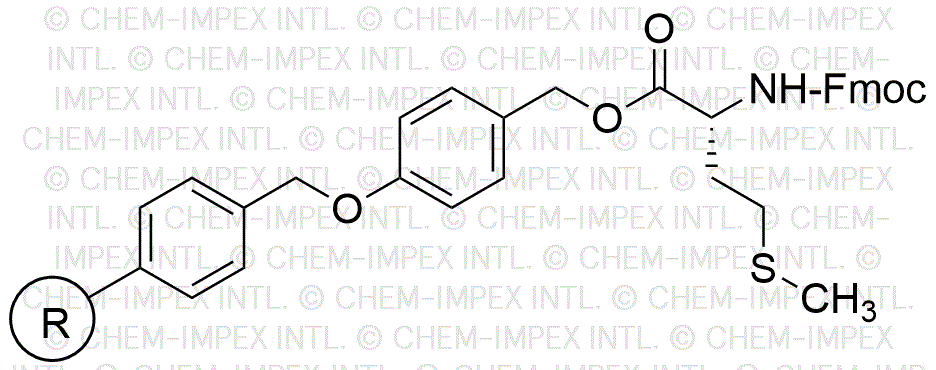Fmoc-D-methionine 4-alkoxybenzyl alcohol resin is widely utilized in research focused on:
- Peptide Synthesis: This resin serves as a solid support for the synthesis of peptides, allowing for efficient coupling and deprotection steps in solid-phase peptide synthesis (SPPS).
- Drug Development: It aids in the development of peptide-based therapeutics, providing a platform for creating novel drug candidates with improved efficacy and specificity.
- Bioconjugation: The resin can be used to attach peptides to various biomolecules, facilitating the creation of targeted drug delivery systems and diagnostic tools.
- Research in Protein Engineering: It supports the study of protein interactions and modifications, enabling researchers to explore structure-function relationships in proteins.
- Custom Peptide Libraries: This resin is ideal for generating diverse peptide libraries for high-throughput screening, helping researchers identify potential leads for various applications.
Informations générales
Propriétés
Sécurité et réglementation
Applications
Fmoc-D-methionine 4-alkoxybenzyl alcohol resin is widely utilized in research focused on:
- Peptide Synthesis: This resin serves as a solid support for the synthesis of peptides, allowing for efficient coupling and deprotection steps in solid-phase peptide synthesis (SPPS).
- Drug Development: It aids in the development of peptide-based therapeutics, providing a platform for creating novel drug candidates with improved efficacy and specificity.
- Bioconjugation: The resin can be used to attach peptides to various biomolecules, facilitating the creation of targeted drug delivery systems and diagnostic tools.
- Research in Protein Engineering: It supports the study of protein interactions and modifications, enabling researchers to explore structure-function relationships in proteins.
- Custom Peptide Libraries: This resin is ideal for generating diverse peptide libraries for high-throughput screening, helping researchers identify potential leads for various applications.
Documents
Fiches de données de sécurité (FDS)
La FDS fournit des informations de sécurité complètes sur la manipulation, le stockage et l’élimination du produit.
Spécifications du produit (PS)
Le PS fournit une description complète des propriétés du produit, notamment sa composition chimique, son état physique, sa pureté et les exigences de stockage. Il détaille également les plages de qualité acceptables et les applications prévues du produit.
Certificats d'analyse (COA)
Recherchez des certificats d'analyse (COA) en saisissant le numéro de lot du produit. Les numéros de lot et de lot se trouvent sur l'étiquette d'un produit, après les mots « Lot » ou « Lot de fabrication ».
Numéro de catalogue
Numéro de lot/série
Certificats d'origine (COO)
Ce certificat d'exploitation confirme le pays dans lequel le produit a été fabriqué, et détaille également les matériaux et composants utilisés et s'il est issu de sources naturelles, synthétiques ou autres sources spécifiques. Ce certificat peut être requis pour les douanes, le commerce et la conformité réglementaire.
Numéro de catalogue
Numéro de lot/série
Fiches de données de sécurité (FDS)
La FDS fournit des informations de sécurité complètes sur la manipulation, le stockage et l’élimination du produit.
DownloadSpécifications du produit (PS)
Le PS fournit une description complète des propriétés du produit, notamment sa composition chimique, son état physique, sa pureté et les exigences de stockage. Il détaille également les plages de qualité acceptables et les applications prévues du produit.
DownloadCertificats d'analyse (COA)
Recherchez des certificats d'analyse (COA) en saisissant le numéro de lot du produit. Les numéros de lot et de lot se trouvent sur l'étiquette d'un produit, après les mots « Lot » ou « Lot de fabrication ».
Numéro de catalogue
Numéro de lot/série
Certificats d'origine (COO)
Ce certificat d'exploitation confirme le pays dans lequel le produit a été fabriqué, et détaille également les matériaux et composants utilisés et s'il est issu de sources naturelles, synthétiques ou autres sources spécifiques. Ce certificat peut être requis pour les douanes, le commerce et la conformité réglementaire.

